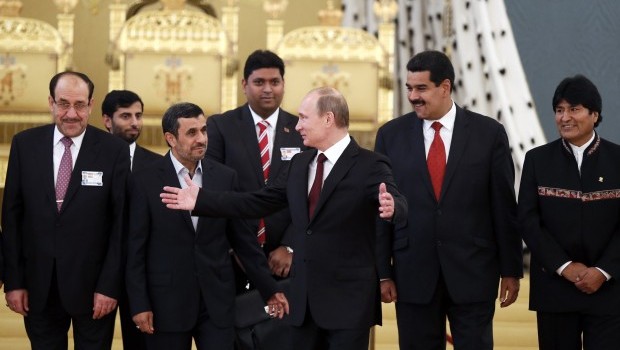
Bolivian President Evo Morales, Venezuelan President Nicolas Maduro, Russia’s President Vladimir Putin, Iranian President Mahmoud Ahmadinejad, Iraqi Prime Minister Nouri al-Maliki and other officials pose for a picture at the Gas Exporting Countries Forum (GECF) at the Kremlin in Moscow, July 1, 2013. Source: Reuters/Yuri Kochetkov
London, Asharq Al-Awsat—Russian president Vladimir Putin successfully urged fellow gas exporting countries to defend a Cold War era gas-pricing system during the second Gas Summit held yesterday in Moscow.
The Gas Exporting Countries Forum (GECF) unanimously agreed to adopt the final joint communiqué, which called for coordinated action to defend the interests of gas exporting countries, and not bow to pressure from the governmental authorities of gas consuming countries.
Putin, who was hosting the summit, affirmed that the forum’s ‘key tasks’ should be to “reach commonly agreed position on price formation, put in place the conditions for reducing excessive price fluctuation, and improve transparency throughout the sector.”
Russian gas exports, half of which are conducted through Gazprom, are secured through long-term supply contracts, and prices are linked to the oil industry—a system that has been in place since the 1960’s when on and offshore gas was discovered in the Netherlands and the UK continental shelf.
Speaking at the Kremlin two years after the first Gas Summit in Doha, Putin threatened that “rejecting the basic principles of long-term contracts means not only a blow for gas producers but also serious costs, and it would undermine energy security for consuming nations.”
Putin also warned his counterparts of “attempts to dictate economic terms that are unacceptable to producers of gas delivered by pipeline.”
Conversely, the emerging US shale gas business is dictated by market forces. European importers are seeking to replace the 50-year-old agreements, which cost between 10 and 15 percent more than market prices. Nonetheless, many European importers are tied in with long-term contracts.
“Anyone with standard oil-linked contracts is likely losing money in Europe,” Marco Alverà, the head of the Italian energy and utilities company Eni, told The New York Times.
On June 27, four days before the summit, the German utilities company RWE AG was awarded compensation by a court of arbitration. This ruling will require Gazprom to pay “reimbursement for payments made since May 2010,” according to a statement released Thursday by RWE.
GECF was formed a decade ago in order to improve cooperation between 13 member-states, including Venezuela, Algeria, Iran, Egypt, Libya, Qatar, and Russia.
Together they account for more than half of the world’s gas exports and 70 percent of global gas reserves.
The GECF summit also discussed European Union legislation known as the Third Energy Package. According the European Commission, this seeks to allow “European consumers to choose between different suppliers and all suppliers, irrespective of their size, to access the market.”
The regulating package, which was adopted in 2007, attempts to separate ownership and distribution of gas pipelines in order to break up monopolies. For Russia, however, it further threatens Gazprom’s market value, which now stands at USD 78 billion, compared with USD 360 billion five years ago.
In this regard, Putin called on GECF leaders to stand together against “discriminatory restrictions imposed by a number of consuming nations with respect to natural gas suppliers in recent years.”
“I’m talking above all about changes in European Union energy regulation and law, the so-called Third Energy Package. The enactment of this gas directive seriously restricts the activity of traditional gas suppliers to the EU market,” the Russian president clarified.
Russia, Iran, and Qatar dominate the forum, as their territories account for up 57 percent of global reserves, but relations between Doha, Moscow, and Tehran have been increasingly strained as the Syrian crisis continues.
Speaking at the conference, Qatari Energy Minister Mohammad Saleh Al-Sada said that each gas exporting country “has its own point of view on the development of the sector.”
In contrast to the Russian rhetoric, Al-Sada urged members to “remember that our pricing policy should also be derived from the interests of consumers, not only of producers.”
